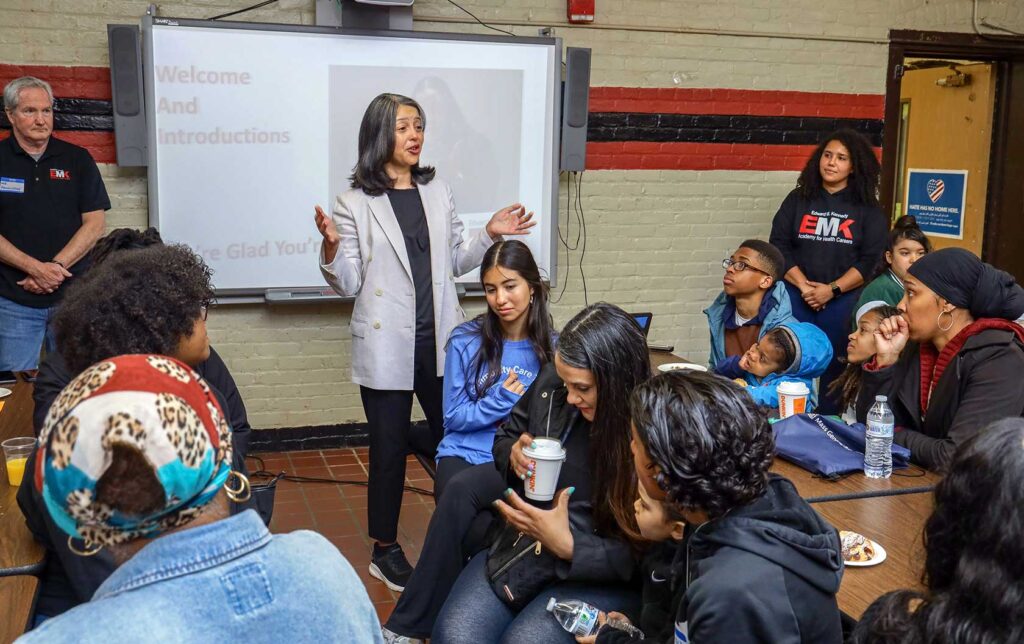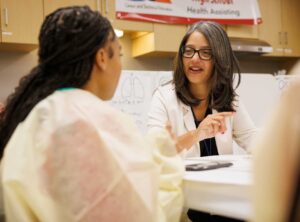For Dr. Elsie Taveras, community health is the guiding light
The MGB pediatrician was appointed to a top health role in the city last month

Dr. Elsie Taveras grew up in the shadow of a large health system on the Upper West Side of Manhattan.
Despite the physical proximity, the health system wasn’t ready or equipped to care for the growing immigrant community on its doorstep.
The facility was set up to be a tertiary care center — with specialized machinery and finely honed expertise. So, while patients showed up to seek care treating specific and complex conditions, members of Taveras’ own community struggled to access basic primary care.
“If you don’t have good access to care and you don’t have these community services or ways to mitigate social support for social risk factors, the result is poor health outcomes,” said Taveras, a pediatrician at Mass General Brigham.
And the issues her community faced weren’t limited to that health system. Taveras declined to say which hospital it was, saying “it could have been any health system.”
Now, Taveras is focused on closing those same gaps she saw growing up in a host of roles that she holds — ranging from the clinical at Mass General to academic roles at Harvard, to the administrative — in Boston’s health and health care scenes.
Her roster of titles is expanding with another new role: chair of the city’s Board of Health, the body that officially oversees the Boston Public Health Commission.
In her new role, to which Taveras was appointed in March, she said she’s excited to support city efforts to remove barriers to access to care and good health.

Dr. Elsie Taveras (right) talks with a student from Edward M. Kennedy Academy for
Health Careers at the school’s Vital Signs Day event in November. PHOTO: COURTESY OF MASS GENERAL BRIGHAM
“We’ve come a long way, especially since COVID, in understanding what is the recipe for moving health outcomes. I think there’s a lot that the city has done, so many successes, and a lot more to do. … I’m just really pleased to be in a position to guide and advise on the work ahead,” said Taveras, whose appointment to chair comes after serving as a member of the board since 2023.
Other local health leaders lauded her appointment to the role.
Pointing to Taveras’ mix of clinical and practical experience, Dr. Sandro Galea, who last held the role as chair, called her “just the right person to do it.”
Dr. Thea James, vice president of mission and associate chief medical officer at Boston Medical Center, called Taveras steady and “quite unflappable” — qualities James said are necessary when facing the many different perspectives Taveras will encounter as she helps guide the city’s health focuses — while still being personable and authentic.
In appointing Taveras to the top board role, Mayor Michelle Wu said she’s excited to see her take on the duties of chair.
“I’m confident she’ll continue her work to make Boston a safe and healthy home for everyone,” Wu said in a statement.
Central to Taveras’ work is a focus on how the community interacts with health and health care and on social determinants of health — the upstream factors that impact a person or community’s health before they get to a hospital, things like housing and food.
Care, she said, must go beyond just titrating a medication, but asking more questions and linking patients to more resources.
“If all I did was improve your medical care — and I didn’t ask you if you were hungry, if you had housing insecurity, if you were worried about not having enough money to pay your utilities, if you needed assistance with finding a job — then I have failed you as a patient,” she said, “because I didn’t recognize how important these social risk factors were in improving your health outcomes.”
It’s a focus she said she’s proud to see changing in the health and healthcare spaces over the past 20 years. And it was a change for Taveras, who, when she came out of medical school, expected to spend her career working with children and families.
But in 1997 after getting her doctorate in medicine from New York University, when she started her residency in a pediatrics program run by Boston Medical Center and Boston Children’s Hospital, she realized that to be most impactful, she needed to go beyond her M.D. and earn a master’s degree in public health.
That change in perspective came after interacting with patients who she said sometimes taught her more than the training she got in medical school.
For example, she was in the delivery room when one patient, a boy, was born. She worked to build a relationship with the mother as his primary care physician. She was convinced she was providing the best care she could.
Then she saw him again, eight months later, when he was brought to the emergency department, unresponsive, after the family’s apartment caught fire. It was started by a space heater the family had used to try to close the gap left when there wasn’t money to pay for enough food and enough heat — what Taveras called the trade-off between “eat and heat” in Boston’s winters.
The boy ultimately died.
“I had never asked about my patients’ — or that patient and the parents’ — ability to pay for utilities, to pay for the food in their home,” Taveras said. “While I have always been, obviously, very aware of social risk factors, it wasn’t until I was living it in my residency training every day, seeing the very real relationship of social risk factors and health and outcomes [that it hit home].”
That shift — Taveras called it “pivotal” — has shaped her career.
“My pediatric residency was a lesson in the ways that we needed to practice medicine differently,” she said. “And by different, by really understanding those social drivers of health.”
She earned her master’s in public health at Harvard and let those community health perspectives shift her path forward. Since 2017, she has worked as executive director of the Kraft Center for Community Health. In 2021, she became the chief community health and health equity officer at Mass General Brigham.
Her understanding of those factors is something that Taveras has worked with and highlights as a key part of who she is and how she handles the job.
For Gladys Vega, president and CEO of Chelsea’s La Colaborativa, Taveras brings a mentality where the default way to address a health issue is to bridge it with community initiatives, to bring medicine out of the lab and into the community in a way that feels most comfortable.
“As an organization with boots on the ground, it’s not a heavy-duty thing where we need to explain how we want things done, because she gets it,” Vega said.
And that work requires meeting people where they are. For example, at the teaching kitchen that La Colaborativa runs in cooperation with Mass General Brigham — an effort to increase access to healthy food in the nonprofit’s hometown of Chelsea — participants learn to cook recipes that bridge traditional Latino dishes with healthier ingredients.
“It’s not about changing the recipes of Latino culture,” Vega said.
The same approach extends to other aspects of how Taveras approaches health and health care, she said: It’s not about rejecting the teas and herbs that residents believe have healing properties but rather supporting those approaches while also encouraging patients to engage with other primary care measures.
“There’s certain teas, there’s certain herbs that [community members believe] save everything, and that is all good, and we respect all that,” Vega said. “But once in a while, come out to the clinic and let’s get your heart checked. Let’s do a diabetes sugar test. Let’s take your [blood] pressure.”
That step is something Vega said is key to how Taveras works, with her focus on health equity and her family background.
“The component of health is all through the lenses of equity because she has lived the experience because she knows about the community because she has family members in similar situations,” Vega said. “It makes it much, much easier.”
Her perspective slots in closely with ongoing efforts from the city.
That focus on social determinants of health has been a focus for the Boston Public Health Commission under the leadership of Dr. Bisola Ojikutu, the executive director of the body.
And Galea, the former Board of Health chair who now is dean of the School of Public Health at Washington University in St. Louis, said that focus on social determinants has been a “signature,” too, of the city’s Board of Health,
In recent years, the city has directed grants to community groups working on topics like mental health, food access, and other wrap-around services in neighborhoods that have been found to have the greatest health inequities.
Efforts by the commission to tackle other health challenges, such as opioid overdose, have been directed through community organizations as well.
And when the commission announced its Live Long and Well agenda, a city-wide effort to close life expectancy gaps across Boston, Ojikutu described that work as focused on the upstream factors, like economic mobility, that exacerbate problems with heart disease, diabetes, preventable cancers, and overdose-related deaths — the health conditions that the BPHC identified as leading causes of premature mortality.
Taveras called that agenda “exactly where we should be focused.”
And the upstream perspective is one that community health leaders like James from Boston Medical Center is key to improving outcomes across the city — and one that she said Taveras fits into.
“If you’re going to be chairing the Board of Health, you have to understand — and particularly if you’re focusing on the things that make communities unhealthy, and particularly chronic diseases — you absolutely have to understand and interrogate down to the very lowest level,” James said. “You have to know what’s driving it.”
She called it the “key” to getting not only the correct answer but having the necessary context for it.
Taveras said that with her new appointment she feels lucky to work on the city’s health priorities under a local leadership that prioritizes community health. The city has seen progress, she said, but still has work to do in closing gaps — something she said she’s ready to try to tackle.
“At the end of the day, we are successful as a Board of Health, we are successful as a Boston Public Health Commission, if we are showing measurable impact on improving health outcomes,” Taveras said. “I think that’s the work ahead of us. I think we’re all rolling up our sleeves to get that done.”






